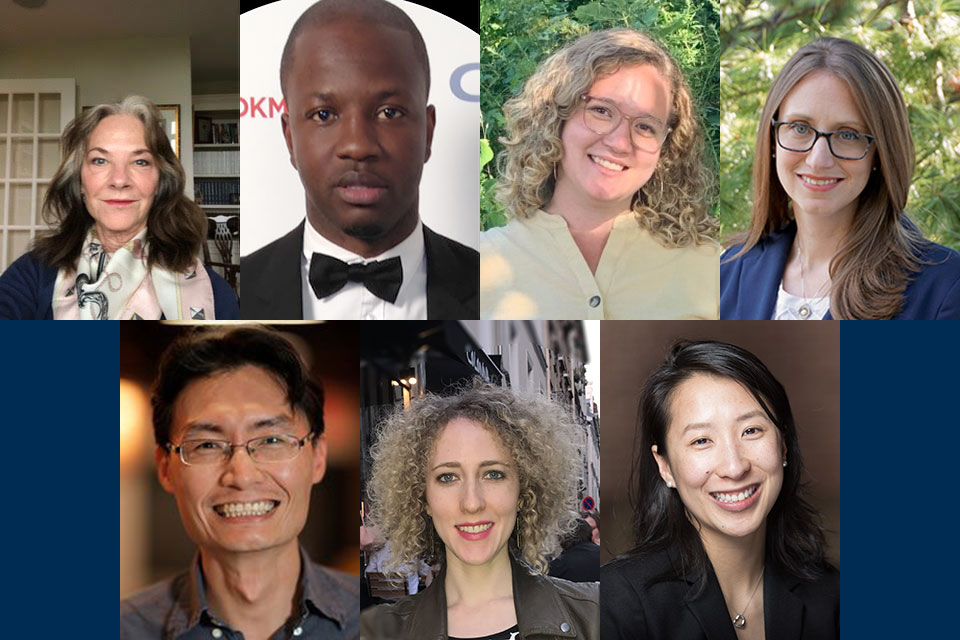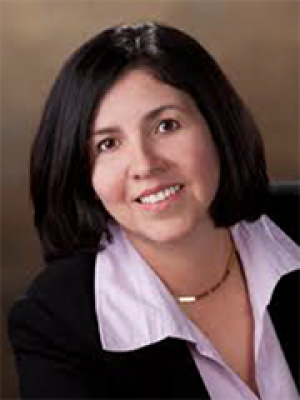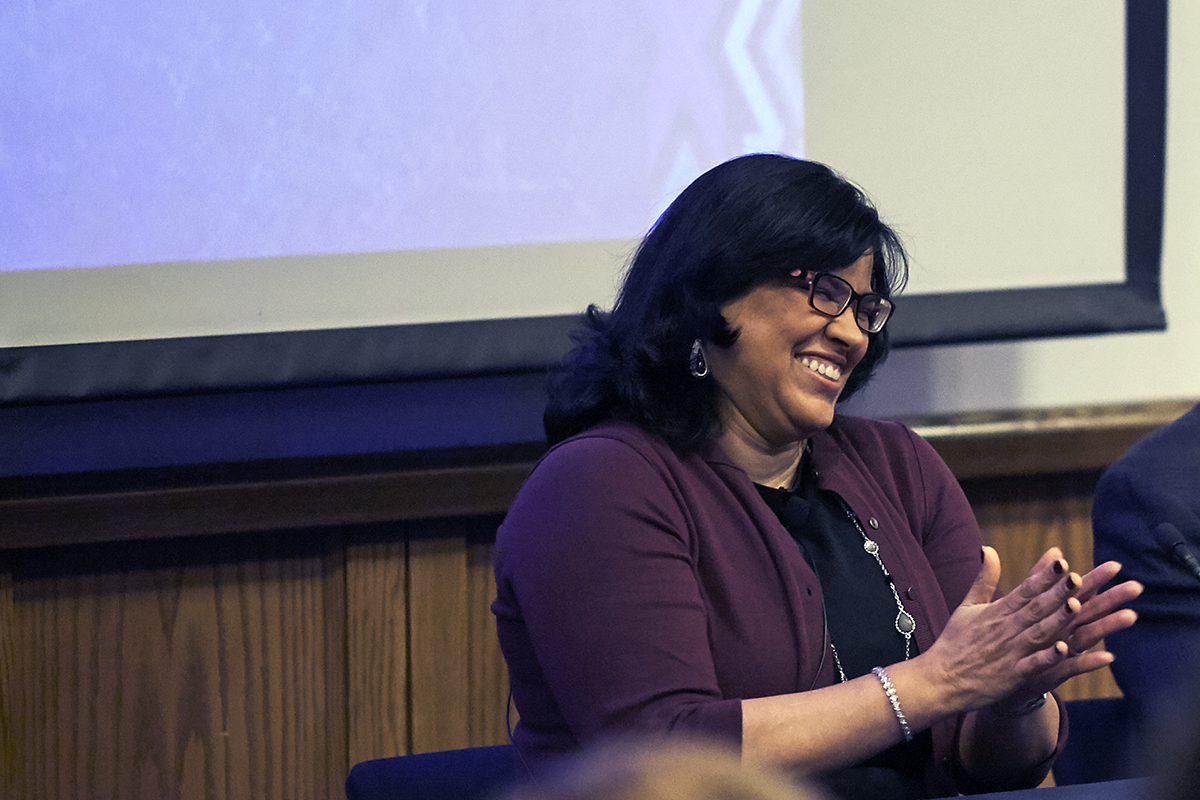One of Michelle Knight-Manuel’s first acts upon being appointed Executive Editor of the Teachers College Record in October 2019 was to launch a “landscape review” of the journal’s content for the previous five years — an effort, she says, that sought to “compel and support a profound commitment toward more inclusivity and broader impact to serve humanity and the public good.
“We call ourselves ‘the voice of scholarship in education,’” Knight-Manuel, Professor of Education in TC’s Department of Curriculum & Teaching, says of the storied journal, which has published continuously since 1900. “But what voices are we actually representing? And are we speaking to issues of the day? People are leaving cities because of the pandemic and wildfires are burning across the west in the United States while simultaneously race relations, climate change and COVID-19 are interrelated global phenomena affecting us all. Are we supporting national and global perspectives related to educational and societal equity?”
Knight-Manuel’s focus on such questions grows directly out of a career centered on making the benefits of education more accessible for marginalized groups. A former middle school ESL/French teacher and college advisor, she has conducted ongoing research on the experiences and needs of immigrant students (One of her most recent articles, published this year with her co-author and former TC student Vaughn Watson in The Record, is titled “Humanizing the Black Immigrant Body: Envisioning Diaspora Literacies of Youth and Young Adults from West African Countries.”). From 2013 through 2015, while also on faculty at TC, she served as Director of Culturally Relevant College and Career Readiness for the New York City Department of Education’s Expanded Success Initiative, guiding teacher professional development at 28 city schools. Her two books, co-authored with her former TC student Joanne Marciano, are Classroom Cultures: Equitable Schooling for Racially Diverse Youth (Teachers College Press 2019) and College Ready: Preparing Black and Latino Youth for Higher Education through a Culturally Relevant Lens. (Teachers College Press 2013)

RECORD KEEPERS The TC Record team. Top row, from left: Lynn Corno, Editor; George Nantwi, Senior Director; Shrien Alshabasy, Digital Publishing Associate; Jessica Blum-DeStefano, Editorial Associate (and Bank Street College of Education faculty member). Bottom row, from left: Ching Fun Lan, Editorial Associate; Amanda Earl, Editorial Graduate Student; Catherine Cheng Stahl, Editorial Graduate Student. (Photos: TC Archives)
It’s not surprising, then, that — as she puts it — Knight-Manuel and her editorial team at the Record “come theoretically and methodologically from a space of wanting to hear voices from minoritized communities nationally and internationally in a leading journal in the field.”
We call ourselves ‘the voice of scholarship in education,’ but what voices are we actually representing? And are we speaking to issues of the day? Are we supporting national and global perspectives related to educational and societal equity?
— Michelle Knight-Manuel
To realize that goal as the Record considers feature articles for acceptance in 2021, Knight-Manuel and her team are currently focusing on other components of the Record that they consider equally important — the journal’s book reviews, commentary and research notes, where readers post comments. The Record now sends out a daily tweet called “Relevant Research for the Times,” which highlights work previously published or recognized by the Record at any point during its prestigious 120-year history.
“We’re living in such an intense time right now, with COVID, school reopenings, race relations — and there’s so much amazingly rich work to draw from in past eras,” says Knight-Manuel.
We’re living in such an intense time right now, with COVID, school reopenings, race relations — and there’s so much amazingly rich work to draw from in past eras.
— Michelle Knight-Manuel
One recent “Relevant Research” tweet highlighted a past Record article titled “The Duplicity of Equality,” which explored how African American parents who live in a high-poverty black community grapple with academic placement and other mechanisms that affect their children’s educational experiences in a racially diverse school. “The author re-tweeted our tweet and wrote about dismantling the duplicity and “protect[ing] our students and families from anti-blackness,” Knight-Manuel says. Another tweet called attention to Teaching Hope and Resilience for Students Experiencing Trauma: Creating Safe and Nurturing Classrooms for Learning, a pre-COVID book initially reviewed in the Record.
The social media push also reflects Knight-Manuel’s desire to make the Record a resource for teachers, parents and other community members. “We’re really committed to creating dialogue between academia and the community to find solutions to educational issues,” she says. “So, we have to be wise and smart in enhancing the interactive ways we can engage communities. This is the era of the online. If we’re not using social media to bring people to the issue, we’re doing them a disservice.”

ADDED EXPERTISE The Record has been adding new board members such as Sylvia Celedón-Pattichis, an expert on bilingual mathematics education at the University of New Mexico. (Photo: TC Archives)
Knight-Manuel’s use of “we” is heartfelt. She’s added new faces to the editorial board — scholars such as Sylvia Celedón-Pattichis, Associate Dean for Research and Community Engagement and Professor of Bilingual/Mathematics Education at the University of New Mexico, and Paul Theobald, an expert on rural education who holds the post of Visiting Professor of Educational Innovation at the University of Southern Indiana in Evansville, and works remotely from his farm in Nebraska.
Michelle is critically thoughtful and socially responsible, and she articulates a vision that I share. It includes a focus on interdisciplinary research, a commitment to supporting people from different ranks in academia, from professors to graduate students, to publish in the Record, and above all, including community members and teachers and research partners.
— Sylvia Celedón-Pattichis, Associate Dean for Research and Community Engagement and Professor of Bilingual/Mathematics Education at the University of New Mexico
“Michelle is critically thoughtful and socially responsible, and she articulates a vision that I share,” says Celedón-Pattichis. “It includes a focus on interdisciplinary research, a commitment to supporting people from different ranks in academia, from professors to graduate students, to publish in the Record, and above all, including community members and teachers and research partners. That’s so important. From the third grade, I was classified as an English language learner until a high school English teacher gave me the opportunity to do college-prep work and a mathematics teacher was explicit about what coursework was needed to get to calculus by senior year. This opportunity opened a pathway to attend UT-Austin and positioned me differently. So we really need to re-think the labels we use and whom we see as ‘knowers.’”
We’re really committed to creating dialogue between academia and the community to find solutions to educational issues. So, we have to be wise and smart in enhancing the interactive ways we can engage communities.
— Michelle Knight-Manuel
Knight-Manuel also has brought a collaborative spirit in engaging a diverse editorial and production staff. The Record has added two graduate assistants — Amanda Earl, a doctoral student in International Educational Development, and Catherine Cheng Stahl, a doctoral student in the Program in Curriculum & Teaching. Earl, whose own scholarship includes learning Nahuatl, an indigenous language in Mexico, is charged with finding ways to make the Record more welcoming to international scholars, while Cheng Stahl, who is skilled in digital and multimodal media, is identifying ways that the Record can educate graduate students about publishing. [Read stories about Amanda Earl and Catherine Cheng Stahl.]
“Involving students is an equity/access issue,” Knight-Manuel says. “Publishing for doctoral students is central to being in the life of the academy, but I can’t tell you how many emerging scholars, and in particular, those of color, have contacted me, saying that they don’t know the first step, they don’t know what should be in a scholarly article. They went through the whole experience of grad school and didn’t get that, and then we know how that sets you up, or doesn’t, for a job and future success in the academy. It saddens me. So how can I support them more systematically through the journal?”
Right now, Knight-Manuel is looking at creating an online “Talks with the Editor” series. Down the road, the Record might even create a course. Such measures are part of “always having a concern that more and more doors of opportunity are opened up through the journal,” Knight-Manuel says — “but ultimately, they also benefit the entire academic community”.
“My adviser was Jeannie Oakes [Presidential Professor Emerita in Educational Equity at UCLA’s Graduate School of Education & Information Studies], and I remember her telling me at that time, ‘People need to know your work. Yes, they’re experts in the field, but they need to hear you as much as you need to hear them.’ So, we don’t want emerging scholars to just see the Record as a place that’s hard to get into, but instead to say, ‘Why shouldn’t I submit there?’”
We don’t want emerging scholars to just see the Record as a place that’s hard to get into, but instead to say, ‘Why shouldn’t I submit there?’
— Michelle Knight-Manuel
Starting in January, the Record’s feature articles, too, will begin to show Knight-Manuel’s imprimatur. She foresees an issue on mental health and well-being in the public schools, and another, proposed by Celedón-Pattichis, on teaching and learning mathematics and computing in multilingual contexts, focusing on teaching methods in the United States, Turkey, New Zealand and other nations that focus on students’ strengths rather than their weaknesses.
Taking on leadership of the Record has been a major adjustment in Knight-Manuel’s life — but she has no regrets.
“I think about this the same way I thought about being a professor,” she says. “It was not necessarily on my radar screen. It feels like my life has been that way. I didn’t know about these possibilities until others opened doors for me. But all of it aligns with what I care about most, which is creating access and equity in education.”
